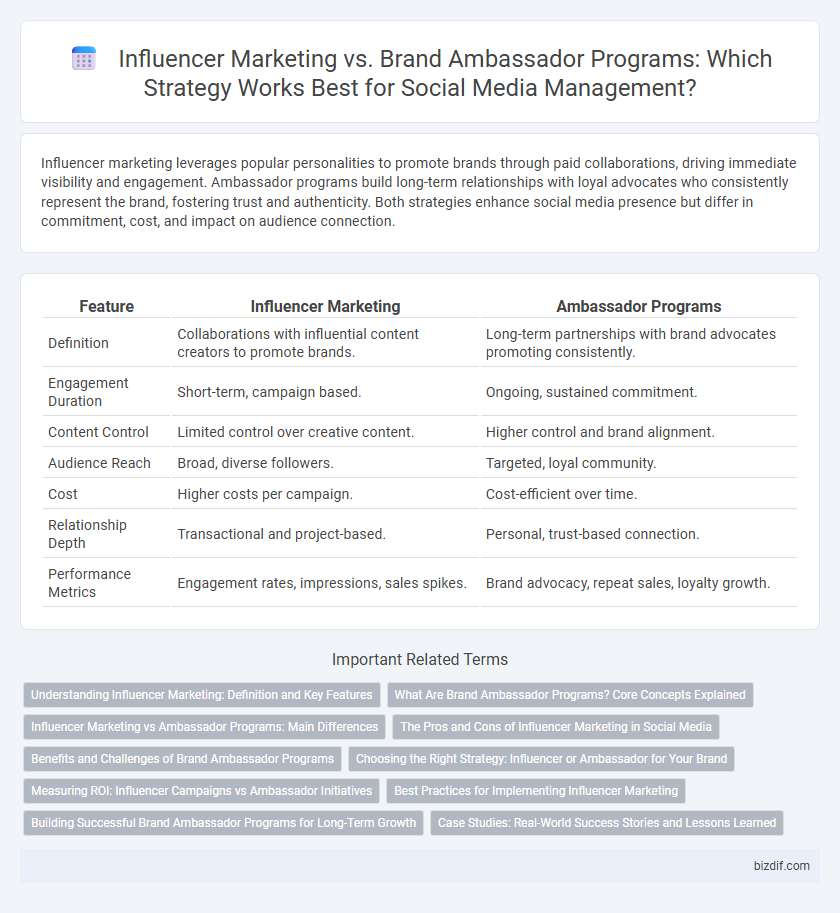Influencer marketing leverages popular personalities to promote brands through paid collaborations, driving immediate visibility and engagement. Ambassador programs build long-term relationships with loyal advocates who consistently represent the brand, fostering trust and authenticity. Both strategies enhance social media presence but differ in commitment, cost, and impact on audience connection.
Table of Comparison
| Feature | Influencer Marketing | Ambassador Programs |
|---|---|---|
| Definition | Collaborations with influential content creators to promote brands. | Long-term partnerships with brand advocates promoting consistently. |
| Engagement Duration | Short-term, campaign based. | Ongoing, sustained commitment. |
| Content Control | Limited control over creative content. | Higher control and brand alignment. |
| Audience Reach | Broad, diverse followers. | Targeted, loyal community. |
| Cost | Higher costs per campaign. | Cost-efficient over time. |
| Relationship Depth | Transactional and project-based. | Personal, trust-based connection. |
| Performance Metrics | Engagement rates, impressions, sales spikes. | Brand advocacy, repeat sales, loyalty growth. |
Understanding Influencer Marketing: Definition and Key Features
Influencer marketing leverages individuals with substantial social media followings to promote brands through authentic content and personal endorsements. Key features include targeted audience reach, content creation tailored to platform trends, and measurable engagement metrics such as likes, shares, and conversions. This strategy emphasizes short-term campaigns that boost brand visibility and drive immediate consumer action.
What Are Brand Ambassador Programs? Core Concepts Explained
Brand ambassador programs involve partnering with loyal customers or advocates to promote a brand consistently over time, creating authentic, long-term relationships that enhance credibility and trust. Unlike short-term influencer marketing campaigns, brand ambassadors represent the brand's values and messaging regularly, often receiving exclusive perks, products, or compensation for ongoing promotion. These programs leverage genuine engagement and word-of-mouth to build deeper brand loyalty and sustainable awareness across social media platforms.
Influencer Marketing vs Ambassador Programs: Main Differences
Influencer marketing leverages the reach of social media personalities for short-term campaigns, emphasizing broad audience engagement and rapid content dissemination. Ambassador programs cultivate long-term brand loyalty through continuous collaboration, often involving exclusive perks and deeper product integration. Key differences include campaign duration, relationship depth, and the level of brand alignment with the promoter.
The Pros and Cons of Influencer Marketing in Social Media
Influencer marketing offers rapid access to niche audiences with measurable engagement metrics, making it effective for short-term campaigns and brand awareness. However, it often involves high costs and risks of misaligned brand values or inconsistent content quality due to limited long-term commitment. Despite these challenges, influencer marketing drives immediate traffic and conversions, though it may lack the sustained loyalty generated by ambassador programs.
Benefits and Challenges of Brand Ambassador Programs
Brand ambassador programs provide authentic and long-term promotion by leveraging individuals deeply aligned with the brand's values, resulting in higher trust and consistent engagement. Managing these programs can be challenging due to the need for continuous relationship-building, clear communication of brand guidelines, and performance tracking across multiple ambassadors. However, the benefits include enhanced brand loyalty, sustained content creation, and amplified reach through genuine advocacy.
Choosing the Right Strategy: Influencer or Ambassador for Your Brand
Influencer marketing offers rapid reach and engagement through diverse creators, ideal for short-term campaigns and launching new products. Ambassador programs foster deeper brand loyalty and consistent promotion by nurturing long-term relationships with dedicated advocates. Brands should evaluate campaign goals, budget, and desired audience connection to select the strategy that maximizes impact and authenticity.
Measuring ROI: Influencer Campaigns vs Ambassador Initiatives
Measuring ROI in influencer marketing campaigns often relies on immediate metrics such as engagement rates, click-throughs, and conversions tracked through unique promo codes or affiliate links. Ambassador programs provide longer-term ROI insights by tracking brand loyalty, repeat purchases, and sustained audience growth linked to consistent brand representation. Advanced analytics platforms enable comparison of short-term campaign performance with the cumulative impact of brand ambassadors, optimizing budget allocation between both strategies.
Best Practices for Implementing Influencer Marketing
Effective influencer marketing requires identifying influencers whose audience aligns with your brand demographics to maximize engagement and conversion rates. Establish clear campaign goals and provide authentic, creative freedom to influencers while ensuring brand guidelines are met for consistent messaging. Regularly analyze performance metrics such as reach, engagement, and ROI to refine strategies and build long-term relationships that enhance brand loyalty.
Building Successful Brand Ambassador Programs for Long-Term Growth
Building successful brand ambassador programs requires selecting authentic influencers who genuinely align with the brand's values and audience. Consistent engagement and exclusive rewards foster loyalty and transform ambassadors into long-term advocates that drive organic growth. Data-driven strategies track performance and optimize campaigns to maximize brand visibility and credibility over time.
Case Studies: Real-World Success Stories and Lessons Learned
Case studies reveal that influencer marketing drives rapid brand awareness through targeted campaigns, exemplified by Daniel Wellington's explosive growth via influencer partnerships. Ambassador programs foster long-term loyalty and authentic engagement, as seen with Patagonia's dedicated community of brand advocates who consistently promote sustainable values. Lessons underline the importance of aligning objectives with suitable strategies to maximize ROI and build genuine connections.
Influencer marketing vs Ambassador programs Infographic

 bizdif.com
bizdif.com